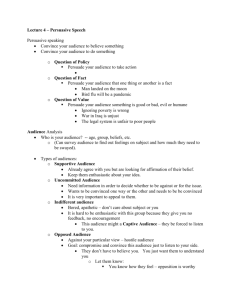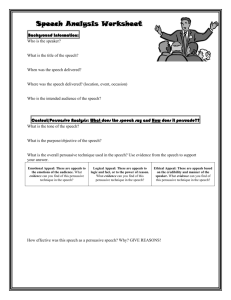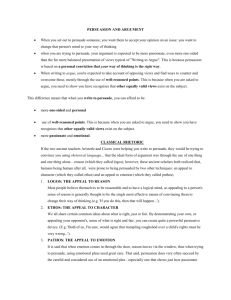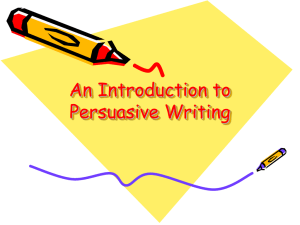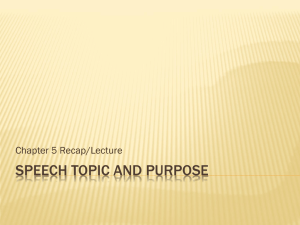Chapter 14
advertisement
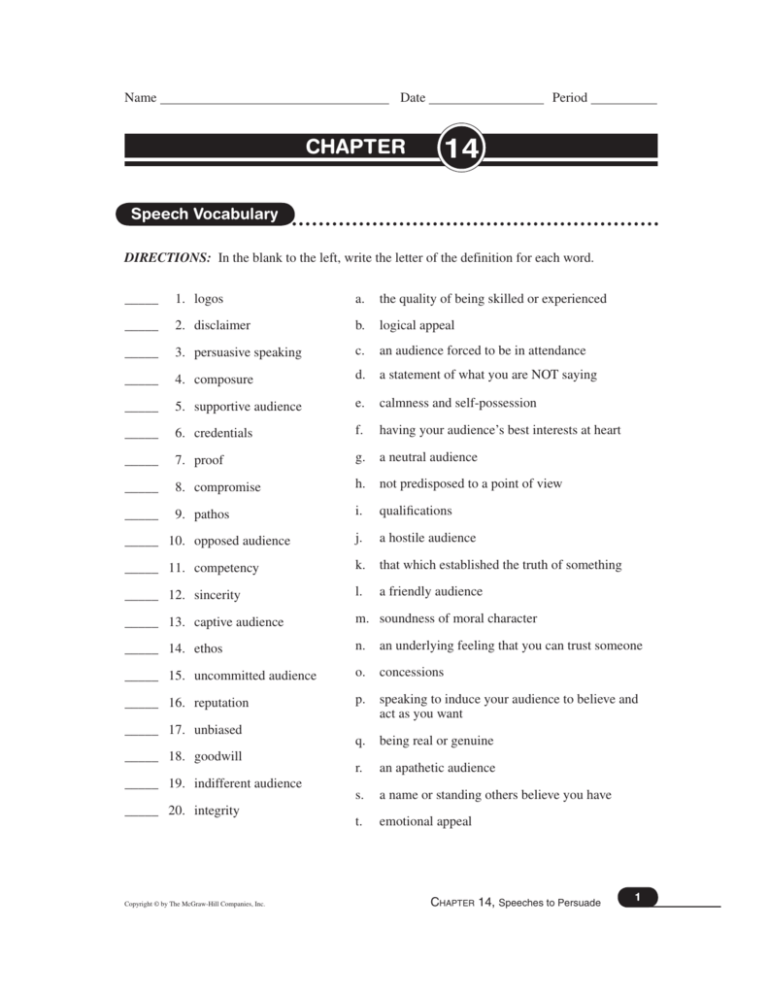
Name Date CHAPTER Period 14 Speech Vocabulary DIRECTIONS: In the blank to the left, write the letter of the definition for each word. _____ 1. logos a. the quality of being skilled or experienced _____ 2. disclaimer b. logical appeal _____ 3. persuasive speaking c. an audience forced to be in attendance _____ 4. composure d. a statement of what you are NOT saying _____ 5. supportive audience e. calmness and self-possession _____ 6. credentials f. having your audience’s best interests at heart _____ 7. proof g. a neutral audience _____ 8. compromise h. not predisposed to a point of view _____ 9. pathos i. qualifications _____ 10. opposed audience j. a hostile audience _____ 11. competency k. that which established the truth of something _____ 12. sincerity l. a friendly audience _____ 13. captive audience m. soundness of moral character _____ 14. ethos n. an underlying feeling that you can trust someone _____ 15. uncommitted audience o. concessions _____ 16. reputation p. speaking to induce your audience to believe and act as you want q. being real or genuine r. an apathetic audience s. a name or standing others believe you have t. emotional appeal _____ 17. unbiased _____ 18. goodwill _____ 19. indifferent audience _____ 20. integrity Copyright © by The McGraw-Hill Companies, Inc. CHAPTER 14, Speeches to Persuade 1 Name Date CHAPTER Period 14 Academic Vocabulary DIRECTIONS: In the blank, write the term from the list which matches the definition. palatable assert cognizant burgeoning temperament instinctively analytical 1. expanding; enlarging; growing 2. familiar; knowledgeable; aware 3. appetizing; pleasing 4. automatically; intuitively 5. logical; organized; rational 6. to claim without proof 7. character; nature DIRECTIONS: Choose the word from the list which best fits each sentence. Write it in the blank. 8. You must prove, not your arguments. 9. He had a very logical, speech. 10. David seems to use platform movement . for the nursing profession. 11. Penney had the right 12. At one time she did not understand what was going wrong, but now she is of the problem. 13. Due to the warm weather and above-average rain, the roses are 2 CHAPTER 14, Speeches to Persuade . Copyright © by The McGraw-Hill Companies, Inc. Name Date Period CHAPTER 14 Things to Remember DIRECTIONS: In the blank to the left, write T if the statement is true and F if the statement is false. _____ 1. A persuasive speaker’s first job is to evaluate the audience. _____ 2. Your audience should never be perceived as the enemy. _____ 3. A supportive audience needs a great deal of information. _____ 4. An uncommitted audience needs little information. _____ 5. The indifferent audience often needs a dose of shock therapy. _____ 6. The persuasive speaker asserts that what she is saying is true. _____ 7. Most people rely very little on their feelings and a great deal on their reason. _____ 8. Good persuasive speakers are born with the talent. DIRECTIONS: Write the appropriate word or phrase in each blank below. something that 9. A persuasive speech asks your audience to you are selling. 10. Giving a speech, a planned speech that you deliver the same way to every group, is not always going to work. 11. With the audience, your objective should be to get a fair hearing. 12. A speaker’s success is the result of appeal, appeal, and appeal. appeal, you invoke the intellect of your audience. 13. With 14. If you are a you stand an excellent chance of convincing your listeners to agree with you. 15. Using a approach, or using two or three of the appeals, gives a speaker a better chance of success. Copyright © by The McGraw-Hill Companies, Inc. CHAPTER 14, Speeches to Persuade 3 Name Date CHAPTER Period 14 Important Concepts DIRECTIONS: Write complete sentences in response to the following. 1. What two things must a persuasive speaker do effectively? 2. List and define the four types of audiences. 3. What is the main purpose of a persuasive speaker who is speaking to an audience? 4. What three things can you do to get a fair hearing from an opposed audience? 5. What are the qualities a speaker needs to have personal appeal with an audience? 4 CHAPTER 14, Speeches to Persuade Copyright © by The McGraw-Hill Companies, Inc. Name Date CHAPTER Period 14 Advance Organizers DIRECTIONS: Logical appeal in a persuasive speech is enhanced through organization. Below you will see some thesis statements for persuasive speeches. On the lines provided, break each thesis statement into three parts, or main headings. Think of these parts as I, II, and III in a speech outline. After you have written the headings, practice saying the thesis aloud, following it with a statement of what three points you will use to prove the thesis. As you learned in Chapter 13, these “parts” are called advance organizers because they signal what is to come in the speech. Families need to restrict television use in the home. I. II. III. Americans need to change their diets. I. II. III. Grades are counterproductive to learning. I. II. III. Americans must end the “throw-away” mentality. I. II. III. Copyright © by The McGraw-Hill Companies, Inc. CHAPTER 14, Speeches to Persuade 5 Name Date CHAPTER Period 14 The Appeal of Honesty DIRECTIONS: As you learned in this chapter, the appeal of honesty is not limited to interpersonal communication with others. Often, you can persuade yourself to take a particular course of action based on your own honesty and your personal character. In the first group of boxes below, record some times that honesty paid off in your relationships with others; in the second set of boxes, record times that it benefited you personally without necessarily affecting others. HONESTY IN MY RELATIONSHIPS WITH OTHERS HONESTY WITH MYSELF 6 CHAPTER 14, Speeches to Persuade Copyright © by The McGraw-Hill Companies, Inc. Name Date CHAPTER Period 14 The “United” Approach DIRECTIONS: Write one logical, one emotional, and one personal appeal to support each topic below. 1. The federal government should ban cigarette advertising. Logical: Emotional: Personal: 2. We need to promote the free enterprise system. Logical: Emotional: Personal: 3. Teachers need to show students how course content is useful in real life. Logical: Emotional: Personal: 4. Knowledge of computers has become a survival skill. Logical: Emotional: Personal: Copyright © by The McGraw-Hill Companies, Inc. CHAPTER 14, Speeches to Persuade 7 Name Date CHAPTER Period 14 Appeals in Speeches DIRECTIONS: Read the student speech at the end of the chapter. On the lines provided, list examples of logical, emotional, and personal appeals you find in the speech. LOGICAL APPEALS 1. 2. 3. 4. 5. EMOTIONAL APPEALS 1. 2. 3. 4. 5. PERSONAL APPEALS 1. 2. 3. 4. 5. 8 CHAPTER 14, Speeches to Persuade Copyright © by The McGraw-Hill Companies, Inc. Name Date CHAPTER Period 14 Competency DIRECTIONS: As you learned, your personal appeal is enhanced if your audience perceives you as competent. Make a list of your credentials below. You can give these to someone introducing you as a speaker, or you can mention some of them in appropriate ways during a persuasive speech. EDUCATIONAL BACKGROUND AND ACCOMPLISHMENTS OTHER OUTSTANDING ACCOMPLISHMENTS SPECIAL EXPERTISE, SKILLS, OR INTERESTS Copyright © by The McGraw-Hill Companies, Inc. CHAPTER 14, Speeches to Persuade 9 Name Date CHAPTER Period 14 Persuasive Speaking Evaluation Sheet Speaker Speech Rate each area from 1 to 10, with 1 being the worst rating and 10 being the best. Skill Rating Comments Analyzing the audience Logical Appeal Organization Proof Emotional Appeal Pathos Telegraphing Interests of audience Personal Appeal Honesty Competency The “united” approach Delivery Appearance Overall Comments: 10 CHAPTER 14, Speeches to Persuade Copyright © by The McGraw-Hill Companies, Inc. Name Date CHAPTER Period 14 Audience Types DIRECTIONS: Next to each real-life situation below, write the letter of the type of audience you would expect if you were addressing that group. A. supportive audience B. uncommitted audience C. indifferent audience D. opposed audience _____ 1. You are addressing a freshman college class about your new book. _____ 2. You are a senior wanting to convince other seniors to raise funds. _____ 3. You are a student wanting to convince the faculty to change the grading system. _____ 4. You want to convince your family to take a vacation. _____ 5. You want to convince your boss to change a policy. _____ 6. You are trying to convince a crowd to vote for you as mayor. _____ 7. You are a parent trying to convince the school board not to cut athletics. _____ 8. You are giving a computer sales presentation to a group of employees. _____ 9. You are a policeman trying to dispel an angry crowd. _____ 10. You are a teacher trying to teach math to junior high school students. _____ 11. You are trying to convince a local logging company not to clear-cut trees. _____ 12. You are a principal explaining a new discipline policy to the student body. _____ 13. You are showing co-workers a more efficient way of doing their work. _____ 14. You are a lifeguard explaining the need for water safety. _____ 15. You are accepting a nomination for office and outlining your platform. _____ 16. You are a movie director trying to convince a company to make your film. _____ 17. You are a businessman trying to attract investors to your company. Copyright © by The McGraw-Hill Companies, Inc. CHAPTER 14, Speeches to Persuade 11 Name Date CHAPTER Period 14 Persuasive Arguments DIRECTIONS: Pick any three situations from your own experience in which you had to or will have to persuade someone to believe and act a certain way. Think of arguments with logical, emotional, and personal appeal. Write them on the lines below. SITUATION: Logical – Emotional – Personal – SITUATION: Logical – Emotional – Personal – SITUATION: Logical – Emotional – Personal – 12 CHAPTER 14, Speeches to Persuade Copyright © by The McGraw-Hill Companies, Inc. Name Date CHAPTER Period 14 Persuasion in Sales DIRECTIONS: Interview a salesperson. Ask the person to give you examples of logical, emotional, and personal appeals used in personal sales presentations. If possible, watch the person in action trying to make a sale. Record your findings below. Role-play a sales presentation using the techniques you learned. LOGICAL APPEALS EMOTIONAL APPEALS PERSONAL APPEALS OTHER TECHNIQUES Copyright © by The McGraw-Hill Companies, Inc. CHAPTER 14, Speeches to Persuade 13 Name Date CHAPTER Period Test 14 DIRECTIONS: In the blank to the left, write T if the statement is true and F if the statement is false. _____ 1. Giving a “canned speech” is not always going to work. _____ 2. Some of the most effective persuasive speeches are given when the speaker does not know much about the audience. _____ 3. Your main purpose in a persuasive speech is to gain as many supporters as possible. _____ 4. You never need to take much time to present to a supportive audience. _____ 5. An indifferent audience is easy to present to because its members do not care one way or the other. _____ 6. With the opposed audience, you should aim to change their minds. _____ 7. Logical appeal is gained through solid reasoning and valid evidence. _____ 8. Using just one type of appeal has a better chance of convincing the audience than using several. DIRECTIONS: Write the word or phrase that completes each sentence. 9. As a skilled persuasive speaker, your first task is to evaluate accurately and perceptively how your feels about you and your message. 10. Authorities generally agree that most audiences can be classified into one of four categories: , and 11. The , , . audience is the easiest to address because the members are ready to promote your ideas. 12. You have a good chance of persuading the audience because it is neutral. 13. The indifferent audience is often a audience, an audience that is being forced to be in attendance. Copyright © by The McGraw-Hill Companies, Inc. CHAPTER 14, Speeches to Persuade 15 Name Date Period 14. The indifferent audience may need a dose of . 15. Be ready to handle a potential confrontation with the audience. 16. It is often wise when addressing a hostile audience to show that you are willing to , or make some concessions of your own. tells listeners what you are not saying or lets them know 17. A that you don’t consider yourself the All-Knowing Expert on Everything. . 18. Logical appeal is also known by the Greek name 19. You can’t merely that what you are saying is true. Audiences need proof. 20. Logical appeal aims for the ; emotional appeal aims for the . 21. Emotional appeal is also known by its Greek name 22. . means leading the way and showing your audience the emotion you wish them to feel by feeling. 23. Having personal appeal, or , means that your listeners will buy what you are selling because they trust in you and your credibility. 24. People who are known to be competent often have impressive . DIRECTIONS: Write answers to the following in complete sentences. 25. List and define the appeals that Aristotle outlined in his work Rhetoric. 16 CHAPTER 14, Speeches to Persuade Copyright © by The McGraw-Hill Companies, Inc. Name Date Period 26. Explain the components of personal appeal. 27. Discuss techniques that will appeal to each type of audience. Copyright © by The McGraw-Hill Companies, Inc. CHAPTER 14, Speeches to Persuade 17 Name Date Period 28. Explain the role of ethics in persuasiveness. 18 CHAPTER 14, Speeches to Persuade Copyright © by The McGraw-Hill Companies, Inc.

